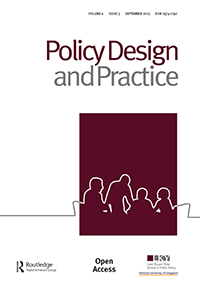Sanitation policy in India – designed to fail?
IF 2.6
Q1 PUBLIC ADMINISTRATION
引用次数: 1
Abstract
Abstract After three decades of disappointing experience with sanitation promotion, the Indian government launched the Swachh Bharat Mission (SBM) in 2014, with great fanfare and optimism. Yet SBM failed to live up to the expectations. This article argues that the dull outcomes are the result of design flaws in the program. The study finds that the goals of SBM are poorly chosen, with private sanitation services being prioritized over those which create public value in Indian context. Furthermore, SBM emphasizes financial and information tools while overlooking the regulatory and organizational tools and their synergies, which makes it nothing more than a poorly designed conditional cash transfer scheme. The design approach employed in the article not only opens the black box of sanitation policy tools but also generates valuable recommendations to guide sanitation policy in developing countries.印度的卫生政策——注定失败?
在经历了30年令人失望的卫生推广经历后,印度政府于2014年大张旗鼓地、乐观地启动了“清洁印度使命”(SBM)。然而,SBM未能达到人们的期望。本文认为,沉闷的结果是程序设计缺陷的结果。该研究发现,SBM的目标选择不当,在印度的情况下,私人卫生服务被优先考虑,而那些创造公共价值的服务被优先考虑。此外,SBM强调金融和信息工具,而忽视了监管和组织工具及其协同作用,这使得它只不过是一个设计不良的有条件现金转移计划。本文采用的设计方法不仅打开了卫生政策工具的黑箱,而且为指导发展中国家的卫生政策提出了有价值的建议。
本文章由计算机程序翻译,如有差异,请以英文原文为准。
求助全文
约1分钟内获得全文
求助全文
来源期刊

Policy Design and Practice
PUBLIC ADMINISTRATION-
CiteScore
10.30
自引率
4.30%
发文量
19
审稿时长
13 weeks
期刊介绍:
 求助内容:
求助内容: 应助结果提醒方式:
应助结果提醒方式:


